Phil 347 exam 2 - Study guides, Class notes & Summaries
Looking for the best study guides, study notes and summaries about Phil 347 exam 2? On this page you'll find 119 study documents about Phil 347 exam 2.
Page 4 out of 119 results
Sort by

-
Phil 347 Quiz 3 Exam Questions With 100% Verified Answers
- Exam (elaborations) • 2 pages • 2024
-
- $10.39
- + learn more
Phil 347 Quiz 3 Exam Questions With 100% Verified Answers In conditional arguments if A then B A Therefore B is an example of: Valid form: Affirming the antecedent In conditional arguments, if A are B C is A therefore, C is B is an example of: Applying a generalization What are the two fallacies associated with deductive reasoning? Affirming the consequent and Denying the antecedent Which deductive reasonings are about relationships? Transitivity, reflexivity, and identity ...

-
PHIL 347 QUIZ 2 COMPLETE EXAM QUESTIONS WITH 100% CORRECT ANSWERS
- Exam (elaborations) • 2 pages • 2024
-
- $9.99
- + learn more
PHIL 347 QUIZ 2 COMPLETE EXAM QUESTIONS WITH 100% CORRECT ANSWERS True or false: Claims can be presented without reasons or background information. True. A critical thinking assesses the _______ of the source and the __________ of the claim itself. Credibility, plausibility. When presented with a claim with no reasons, the critical thinker has options: Evaluate the credibility of the person making the claim, examine the plausibility of the claim itself, investigate the claim independen...
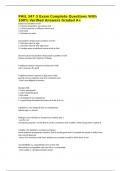
-
PHIL 347 3 Exam Complete Questions With 100% Verified Answers Graded A+
- Exam (elaborations) • 3 pages • 2024
-
- $10.39
- + learn more
PHIL 347 3 Exam Complete Questions With 100% Verified Answers Graded A+ Epicurean's problem of evil 1. If God is powerful he can remove evil 2. If God is good he is willing to remove evil 3. Evil exists 4. God does not exist Assumptions of Epicurean's problem of evil 3 1. God does what he wills 2. God does what he wills right away 3. It makes sense to attribute human traits to God Decartes obj to Assumptions of Epicurean's problem of evil human concepts don't apply to inf ...
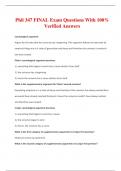
-
Phil 347 FINAL Exam Questions With 100% Verified Answers
- Exam (elaborations) • 11 pages • 2024
- Available in package deal
-
- $11.49
- + learn more
Phil 347 FINAL Exam Questions With 100% Verified Answers Cosmological argument Argues for the idea that the universe has a beginning. This argument follows the idea that all empirical things are in a state of generation and decay and therefore the universe is material and was created. Plato's cosmological argument premises 1.) everything that begins to exists has a cause distinct from itself 2.) the universe has a beginning 3.) hence the universe has a cause distinct from itself What ...
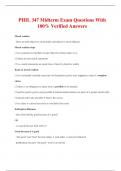
-
PHIL 347 Midterm Exam Questions With 100% Verified Answers
- Exam (elaborations) • 5 pages • 2024
- Available in package deal
-
- $10.49
- + learn more
PHIL 347 Midterm Exam Questions With 100% Verified Answers Moral realism - there are both objective moral truths and objective moral fallacies Moral realism steps (1) no statement is true/false except objective reality makes it so (2) there are true moral statements (3) so, moral statements are made true or false by objective reality Kant on moral realism (1) it is rationally (morally necessary) to find perfect good, since happiness comes f. complete virtue (2) there is an obligation ...
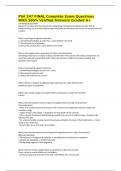
-
Phil 347 FINAL Complete Exam Questions With 100% Verified Answers Graded A+
- Exam (elaborations) • 6 pages • 2024
-
- $10.39
- + learn more
Phil 347 FINAL Complete Exam Questions With 100% Verified Answers Graded A+ Cosmological argument Argues for the idea that the universe has a beginning. This argument follows the idea that all empirical things are in a state of generation and decay and therefore the universe is material and was created. Plato's cosmological argument premises 1.) everything that begins to exists has a cause distinct from itself 2.) the universe has a beginning 3.) hence the universe has a cause distinc...
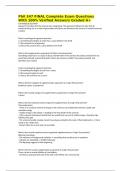
-
PHIL 347 Exam Package deal Questions with 100% Correct Answers
- Package deal • 13 items • 2024
-
- $34.99
- + learn more
1 Exam (elaborations) Phil 347 Week 3 Checkpoint Complete Exam Questions And Answers Graded A+ 2 Exam (elaborations) PHIL 347 Exam Questions With 100% Verified Answers Graded A+ 3 Exam (elaborations) PHIL347: Checkpoint 1 Exam Questions With 100% Verified Answers Graded A+ 4 Exam (elaborations) Phil 347 FINAL Complete Exam Questions With 100% Ve
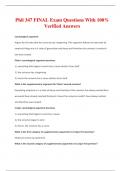
-
Phil 347 FINAL Exam Questions With 100% Verified Answers
- Exam (elaborations) • 11 pages • 2024
- Available in package deal
-
- $12.49
- + learn more
Phil 347 FINAL Exam Questions With 100% Verified Answers Cosmological argument Argues for the idea that the universe has a beginning. This argument follows the idea that all empirical things are in a state of generation and decay and therefore the universe is material and was created. Plato's cosmological argument premises 1.) everything that begins to exists has a cause distinct from itself 2.) the universe has a beginning 3.) hence the universe has a cause distinct from itself What ...
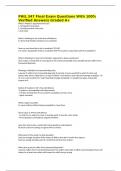
-
PHIL 347 Final Exam Questions With 100% Verified Answers Graded A+
- Exam (elaborations) • 4 pages • 2024
-
- $10.39
- + learn more
PHIL 347 Final Exam Questions With 100% Verified Answers Graded A+ What is Mackie's argument from Evil? 1. Omnipotent God exists 2. Omnibenevolent God exists 3. Evil exists What is Plantinga's aim of his free will defence To show that Mackie's premises are consistent How can you show that a set is consistent? (P,Q,R) You need a proposition S that is consistent with P & Q and in conjunction with P & Q implies R What is Plantinga's S term to for Mackie's argument to show ...

-
Phil 347 (A+ GRADED ALREADY)
- Package deal • 5 items • 2024
-
- $25.60
- + learn more
Phil 347 Midterm 1 (100% Accurate Answers) FSHD PHIL 347 (All Accurately Answered) FSHD PHIL PSY 347 Exam 2-University of Arizona (A+ Verified) 2024. PHIL 347 FINAL (WITH COMPLETE SOLUTIONS) Phil 347 FINAL (A+ GRADED ALREADY)

Do you wonder why so many students wear nice clothes, have money to spare and enjoy tons of free time? Well, they sell on Stuvia! Imagine your study notes being downloaded a dozen times for $15 each. Every. Single. Day. Discover all about earning on Stuvia


